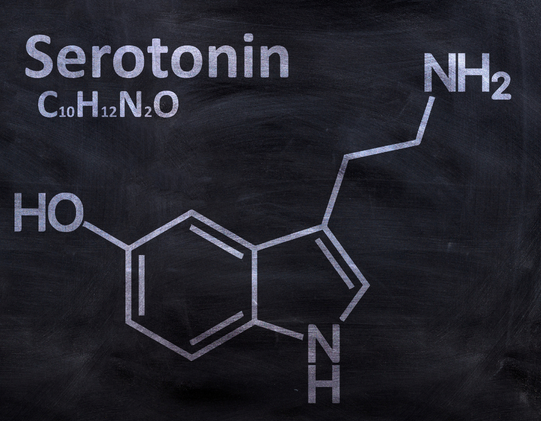
7 Benefits of Ashwagandha
February 3, 2024
The Keto Diet: How Can It Benefit You
February 9, 2024
Feeling down? Could be low levels of serotonin!
Serotonin is a neurotransmitter (chemical messenger) found in the brain and throughout the body that plays a vital role in regulating mood, sleep, appetite and other important functions.
But, what role does it play in mood and how you can boost your levels naturally?
Read on for Serotonin 101!
The Functions of Serotonin
Serotonin, also known as 5-hydroxytryptamine (5-HT), is a monoamine neurotransmitter. It also acts as a hormone.
As a neurotransmitter, serotonin carries messages between nerve cells in your brain (your central nervous system) and throughout your body (your peripheral nervous system). It is these chemical messages that tell your body how to work.(1) When your levels of serotonin are off, so are the messages.
Serotonin plays a key role in mood and emotion, influencing social behavior sleep, appetite, digestion, nausea, wound healing, modulating pain perception, bone health, blood clotting and sexual desire.
There is a large connection between the brain and the gut and when we are looking at serotonin, we can see that connection very clearly. About 90% of serotonin is found in the cells lining your gastrointestinal tract. It’s released into your blood circulation and absorbed by platelets. Only about 10% is produced in your brain.(1)
Serotonin Deficiency / Imbalance
There isn’t an easy answer to the serotonin deficiency question because scientists haven’t concluded the right balance yet. It’s generally discussed in terms of the symptoms that result, rather than the exact levels that might bring it on.(2)
Serotonin deficiency has symptoms that are far reaching. Here are some of the most common:
Psychological Symptoms
Psychological symptoms may include:
- Anxiety
- Depressed Mood
- Aggression
- Impulsive Behavior
- Insomnia
- Dementia and Cognitive Decline
Low levels are also associated with:
- Obsessive-Compulsive Disorder (OCD)
- Panic Disorder
- Suicidal Behavior
- Post-Traumatic Stress Disorder (PTSD)
- Social Anxiety Disorder
Physical Symptoms
Research has begun to show activity in increasing numbers of bodily processes, including:(3)
- Metabolism
- Sleep
- Blood Clotting
- Energy Balance
- Digestion
- Body Sugar Balance
- Cardiac Function
- Liver Function
- Immune System Response
- Pain Production
A deficiency won’t show up the same way in everyone. Due to bioindividuality, there are many factors at play that can affect how a person will respond to an imbalance.
There is also the possibility of having too high a level of serotonin. This is called serotonin syndrome and is a serious drug reaction.
It can occur when you increase the dose of certain medications or start taking a new drug. Most often this is caused by combining medications that contain serotonin, such as a migraine medication and an antidepressant.
Signs and symptoms include:
- Agitation or Restlessness
- Insomnia
- Confusion
- Rapid heart rate and high blood pressure
- Dilated pupils
- Loss of muscle coordination or twitching muscles
- High blood pressure
- Muscle rigidity
- Heavy sweating
- Diarrhea
- Headache
- Shivering
- Goose bumps
If you suspect you might have serotonin syndrome after starting a new drug or increasing the dose of a drug you’re already taking, call your health care provider right away or go to the emergency room.(4)
How To Increase Serotonin Levels
Ways to increase serotonin levels include:
- Eating more tryptophan-containing foods – this includes foods such as Salmon, Eggs, Cheese, Turkey, Pineapples, Nuts, Oats and Seeds
- Getting more sunlight – not getting enough sunlight can lead to S.A.D. so try to get at least 10 – 15 minutes of morning sunlight each day. You can also supplement with Vitamin D3.
- Taking certain supplements – Tryptophan, probiotics and SAMe are great to start with. Make sure to check out my list of top supplements for depression. Many of these can help with serotonin levels.
- Getting more exercise and lowering your stress level.
Conclusion
Serotonin has a crucial role in regulating many different processes within our body. When the levels of serotonin in our body drop, we start seeing it through symptoms in our mental and physical health. If you’ve noticed any of the symptoms listed above, try some of the tips for increasing your serotonin levels to see if it makes a difference for you. If you are struggling with more severe feelings of depression, please reach out to someone for help like a close friend, family or call 988 to speak to someone.
Found this article interesting?
For more tips and the latest and greatest in health optimization, follow me on Instagram.
Sources
- https://my.clevelandclinic.org/health/articles/22572-serotonin#:~:text=Serotonin%20plays%20several%20roles%20in,mania%20and%20other%20health%20conditions.
- https://www.healthline.com/health/serotonin-deficiency#what-is-serotonin-deficiency
- https://academic.oup.com/edrv/article/40/4/1092/5406261
- https://www.mayoclinic.org/diseases-conditions/serotonin-syndrome/symptoms-causes/syc-20354758




